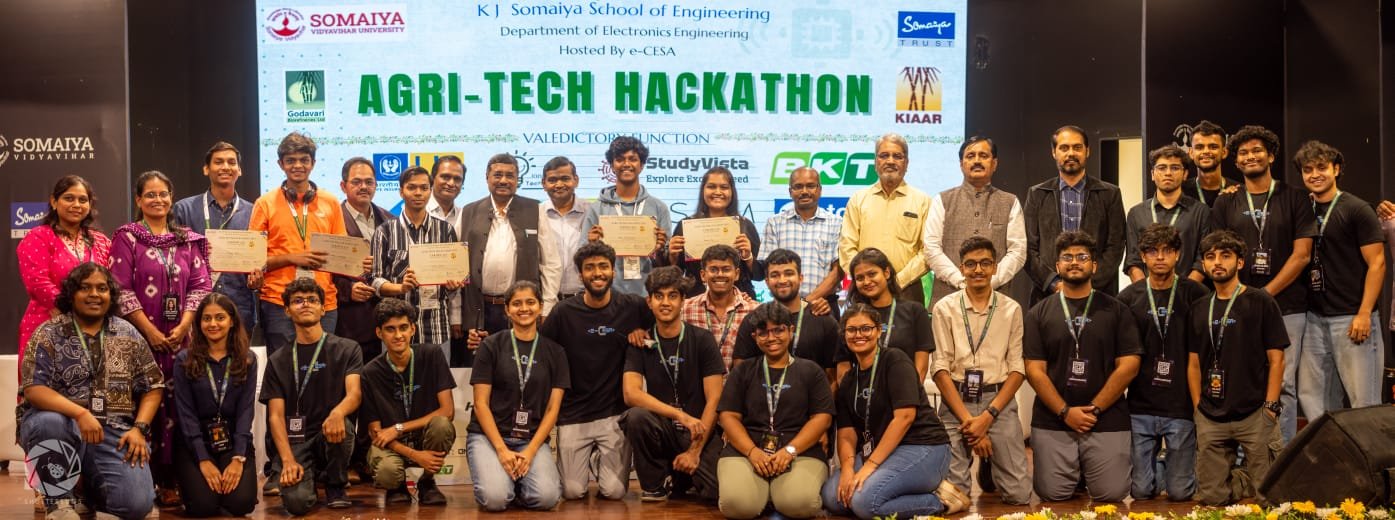Saturday, 21 February 2026

K J Somaiya School of Engineering at Somaiya Vidyavihar University organized a 24-hour Agritech Hackathon from March 27th to 28th, 2025, aimed at dealing with the significant challenges faced by Indian farmers. Indian agriculture faces a lot of issues against nature and time. From unpredictable weather patterns and the growing impacts of climate change to labour shortages and deteriorating soil health, the challenges are immense. Post-harvest losses, caused by poor infrastructure and lack of storage, exacerbate the situation. On top of that, fluctuating market prices often leave farmers selling their produce at a loss
The event saw a remarkable 1,200 registrations, with 300 participants from across India shortlisted for the competition, each bringing expertise in Agriculture, Engineering, and Management.
The hackathon provided a platform for participants to develop innovative solutions aimed at providing affordable and sustainable projects to manage these issues, with the help of advanced technologies like IoT (Internet of Things), AI (Artificial Intelligence), and data analytics.
A highlight of the event was a panel discussion, moderated by Dr. Neetin Desai, a distinguished biotechnologist and Dean of the Faculty of Science at Somaiya Vidyavihar University, with expertise in agricultural biotechnology and sustainability. The panel delved into how technology can transform farming, addressing crucial issues such as enhancing irrigation practices, combating crop diseases, and narrowing the technological divide in rural areas. Discussions emphasized providing farmers with easy-to-use, affordable tools, such as mobile apps for weather forecasts, improved irrigation solutions, and advanced farming equipment.
Notable figures who contributed to the event included Mr. Prasanna Popatrao Pawar, a respected farmer who has promoted practices like drip irrigation, rainwater harvesting, and watershed management to enhance crop yields and empower rural communities. Mr. Abhishek Reddy, a renowned industry expert specializing in Agri-Tech and innovative solutions for the agricultural sector, also shared his insights. Mr. Jeevan Garsund from RCF, an expert in fertilizers and chemical production, focused on enhancing agricultural productivity and sustainability. Dr. Nandkumar Kunchge and Dr. Bodake, both renowned experts in agricultural technology, also provided valuable guidance to the participants. Dr. Kunchge specializes in the application of innovative technologies to improve crop yield and soil health, with a focus on sustainable farming practices. Dr. Bodake, with extensive experience in agricultural engineering, has contributed to various projects that bridge the gap between technology and rural farming communities, helping to introduce advanced, yet practical solutions for modern-day farming challenges. Their expertise played a crucial role in shaping the solutions developed during the hackathon, further enriching the learning experience for the participants.
The event lasted for 24 hours, during which teams presented their solutions in three jury rounds. Projects were judged based on criteria such as innovation, feasibility, scalability, and potential impact on the agricultural sector. During the valedictory function, Dr. Raghunath K. Shegaonkar, a respected academician specializing in engineering and technological research, was joined by Dashrath Tamble, former Director of the Department of Agriculture, Government of Maharashtra, known for his significant contributions to agricultural development and policy implementation. Dr. Kuber from BARC, an expert in using nuclear and radiation technologies to enhance soil health and crop yields, and Dr. Nandkumar Gilke, Registrar of Somaiya Vidyavihar University, also guided the participants.
During the Agritech Hackathon, participants worked tirelessly for 24 hours, addressing various challenges faced by Indian farming. They explored innovative technological solutions based on key themes such as precision farming, yield prediction and enhancement, supply chain management, improving irrigation systems, preventing crop diseases, enhancing soil health, managing post-harvest losses, and creating sustainable farming practices.
The winning teams received prizes worth ₹2 Lakhs, awarded as follows:
1st Winner: Team Stranger Strings from Vivekanand Education Society’s Institute of Technology (VESIT), Mumbai
1st Runner-up: Team IoTVerse from Rajkiya Engineering College, Banda, Uttar Pradesh and Team AgriBot from Shri Shankaracharya Institute of Professional Management and Technology, Raipur
2nd Runner-up: Team Greenpulse from K.J. Somaiya School of Engineering, Somaiya Vidyavihar University
The hackathon was organized by the Electronics Department’s Student Association (e-CESA) at Somaiya Vidyavihar University, with faculty mentors Dr Jagannath Nirmal, Prof. Amrita Naiskatam and Prof. Megha Sharma guiding the students.
Dr. Suresh Ukarande and Dr. Jagnnath Nirmal, who conceptualized the event, played a pivotal role in bringing the first-ever Agritech Hackathon to life at a private university. In his inaugural address, Dr. Suresh Ukarande, Director of K.J. Somaiya School of Engineering, emphasized the importance of integrating technology with farming practices to improve agricultural outcomes. Dr. Rajasekharan Pillai, Vice Chancellor of Somaiya Vidyavihar University, expressed his appreciation for the enthusiasm and innovative spirit shown by the participants, reinforcing the university’s commitment to supporting initiatives that contribute to the betterment of society. This event not only showcased the vital role of technology in addressing India’s agricultural challenges but also created a platform for collaboration among farmers, academics, industry experts, and young Agri-Tech innovators. In a country where millions of farmers still struggle with issues like water scarcity, crop diseases, and market instability, the event highlighted how technology can provide practical, real-world solutions. By fostering connections between experienced professionals and the younger generation of innovators, the event also encouraged the development of affordable, scalable solutions that can be easily adopted by rural communities, ultimately improving the livelihoods of farmers and making agriculture more sustainable across India.